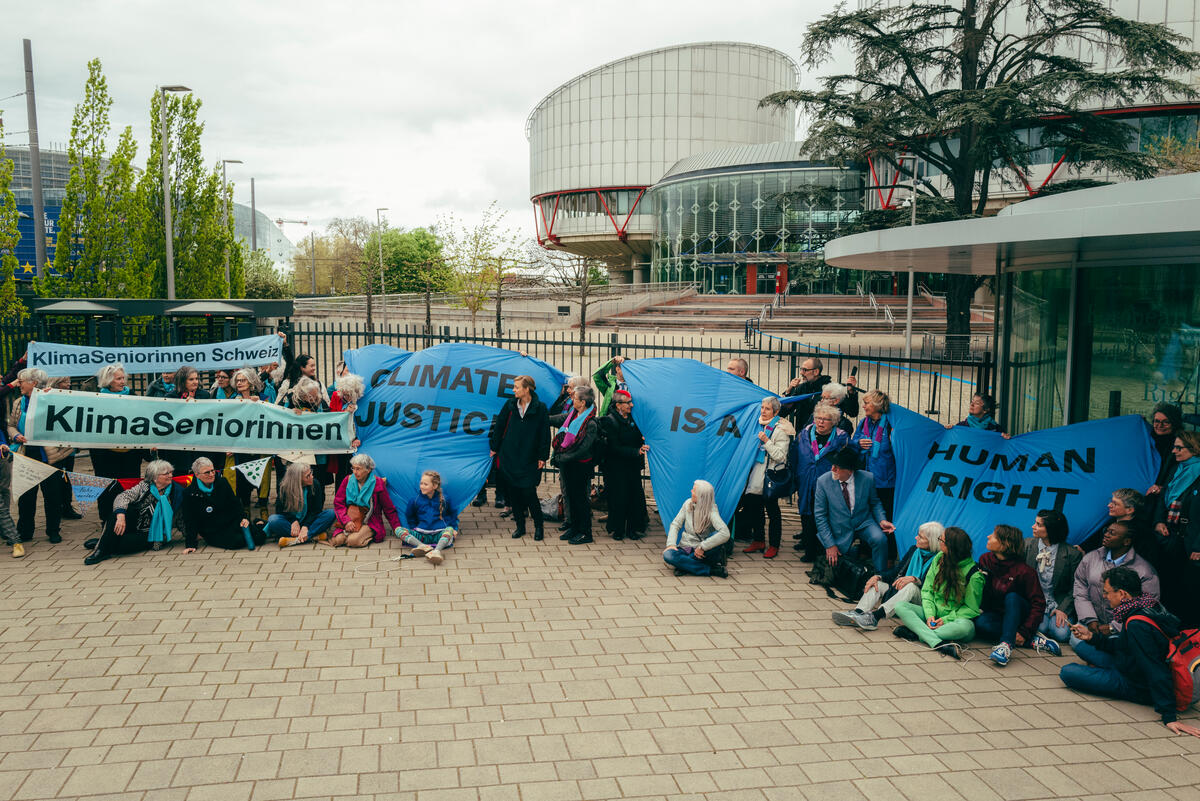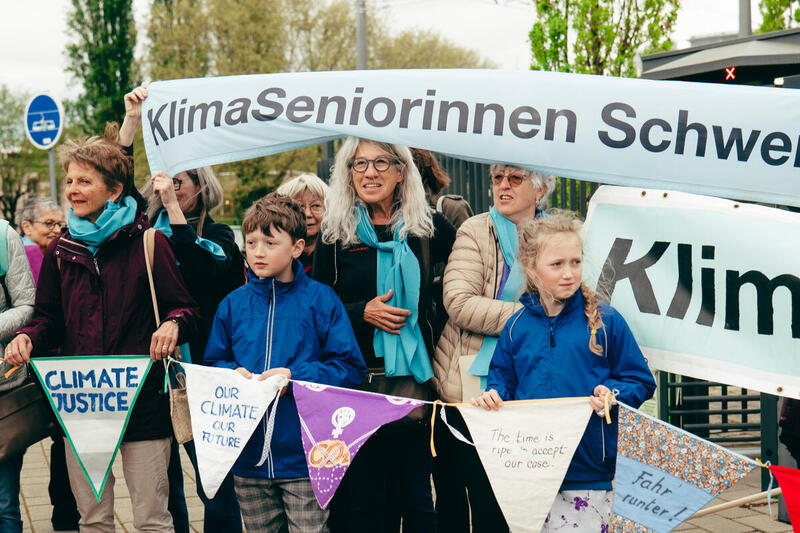Europe’s top human rights court delivered a landmark ruling this week, siding in favor of a group of older Swiss women – Senior Women for Climate Protection – who made the case that their government had insufficiently protected them from the impacts of climate change.
The European Court of Human Rights (ECtHR) on Tuesday said Switzerland had “failed to comply with its duties” to combat climate change and meet emissions targets, violating the European Convention on Human Rights. The lawsuit – Verein KlimaSeniorinnen Schweiz and Others v. Switzerland – was brought by roughly 2,000 women over the age of 64 who argued they were more vulnerable to extreme heatwaves caused by a warming planet.
It’s a very clear statement from the highest court on human rights in Europe that the climate crisis is a human rights crisis.
“It’s a very clear statement from the highest court on human rights in Europe that the climate crisis is a human rights crisis. Climate action is a legal duty,” says Lucy Maxwell, co-director of the non-profit Climate Litigation Network.
Even though the case centers around the Swiss government, the ruling establishes a legal precedent for all 46 countries that are part of the Council of Europe.
“Although it's a binding ruling only for Switzerland, now every member country knows what is expected of them in terms of climate policy,” explains Sarah Tak, a coordinator at the Brussels-based L’Affaire Climat. Tak’s climate advocacy organisation was the engine behind a watershed November 2023 ruling in Belgium, which resulted in the Brussels Court of Appeal ordering the national and regional governments to reduce their greenhouse gas emissions by at least 55% by 2030.
 The KlimaSeniorinnen Schweiz in front of the European Court of Human Rights in Strasbourg. © Shervine Nafissi / Greenpeace
The KlimaSeniorinnen Schweiz in front of the European Court of Human Rights in Strasbourg. © Shervine Nafissi / Greenpeace
The ECtHR’s decision marks the first time that an international court has issued a ruling on climate change, which could have ripple effects well beyond Europe’s borders. “It’s of global significance. National courts and many regional and international bodies look to the European Court of Human Rights because it is setting norms,” says Tak.
Notably, the verdict spells out concrete policy suggestions for governments. The court “explicitly took the 1.5 degrees [of warming] as a target and confirmed the net zero goal for 2050, saying governments should adopt binding regulations to reduce their emissions, even including intermediate goals,” Tak explains, referencing the 2015 Paris Agreement. Nevertheless, the ECtHR did not specifically mandate a route to achieve those goals.
Now every member country knows what is expected of them in terms of climate policy.
Litigation has emerged as a powerful tool in the fight against climate change over the last years. “Almost every country in Europe has a climate lawsuit at the moment,” says Louise Fournier, an attorney at Greenpeace who leads the advocacy group’s climate justice and liability strategies. “Courts all over the world have said, ‘yes,’ we will take your cases, there are legal duties here, and it is appropriate for us to hold governments to account,” she adds.
The newfound legal push, Tak says, is the result of “a grassroots movement” that “comes from a very deep-rooted frustration of citizens” over political inaction, despite decades-long warnings by scientists. The wave of climate cases against governments and companies around the world has especially grown since 2015 when a Dutch court ordered the country’s government to cut carbon emissions in what was the world’s first climate liability suit.
“Many affected communities and concerned people feel that they've tried lots of other options to push their governments to act and protect them,” says Maxwell of the Climate Litigation Network. “There have been a number of very important court victories in the last eight years, which have given hope to people around the world that litigation can be one of the tools to achieve greater climate action.”
Over 1,500 climate-related cases have been filed since 2015, more than 50% of which have had favourable judicial outcomes for climate advocates, according to the London School of Economics’ 2023 Global Trends in Climate Litigation report.
I'm sure this will spark a whole new generation of climate cases. It's booming.
Tuesday’s decision could prove significant for ongoing lawsuits as well. “National courts now have a very firm grip on how they should rule in these kinds of cases,” says Tak. She adds: “I'm sure this will spark a whole new generation of climate cases. It's booming.”
While some experts warn it’s too soon to celebrate, citing doubts over whether the Swiss government will act on the ruling, Maxwell points to the impact previous verdicts have had: “There is very clear evidence that governments comply when they are ordered by a court to increase their climate actions.”
That was the case following the 2015 ruling in the Netherlands, which ultimately prompted the government to shutter coal-fired power stations and implement a multi-billion-euro investment package in renewable energy and energy efficiency. Similarly, after Germany’s constitutional court ruled in 2021 that the country’s climate protection measures were insufficient, the government moved to bring forward its goal to reduce greenhouse gas emissions to ‘net zero’ by five years, to 2045.
 KlimaSeniorinnen and supporters on the day of the verdict in Strasbourg. © Shervine Nafissi / Greenpeace
KlimaSeniorinnen and supporters on the day of the verdict in Strasbourg. © Shervine Nafissi / Greenpeace
The Swiss government is widely expected to take greater action to reduce its emissions. “There is a lot of public pressure within and outside of Switzerland to ensure that happens,” Maxwell argues, adding: “The European Convention and its court system have their own enforcement mechanism as well.”
The ruling is likely to inform steps by EU governments in the coming months, which are set to present their national energy and climate plans to the European Commission before the end of June. Maxwell notes that a December 2023 assessment by the EU’s executive had concluded member states’ current climate policies would not allow the EU to reach its 2030 climate goals and should be improved.
“So, all eyes are now on our governments to step up, act in line with science and protect our human rights in the climate crisis,” says Maxwell.